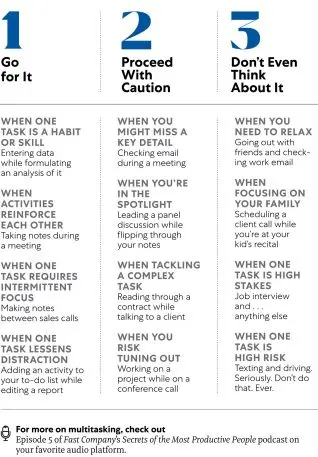Editor’s Note: This story is part of our feature, “Secrets of 13 of the most productive people.” See the complete 2018 list here.
Most of us like to claim we’re excellent multitaskers, but decades of research by cognitive psychologists into “dual-task performance” reveals that when humans actually attempt two things at once, we slow down, and performance in both areas suffers.
While true multitasking–doing two or more things simultaneously–is rarely effective, sensible toggling among activities can be fruitful. Studies, including a seminal 2007 one called “Productivity Effects in Information Diffusion in Networks” from MIT’s Sloan School of Management, show that people who juggle between two and four projects at a time tend to be more productive than those who focus exclusively on one. This way, you can continue making progress in one area when you’ve temporarily run out of steam in another. Review the chart to determine whether the alchemy between two activities is likely to succeed–or explode.

Recognize your brand’s excellence by applying to this year’s Brands That Matter Awards before the early-rate deadline, May 3.
